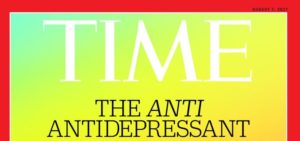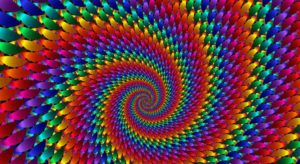 Is TIME Telling the Truth about Ketamine?
Is TIME Telling the Truth about Ketamine?
In the most recent issue of TIME magazine (7/27/17), the cover story by Mandy Oaklander celebrates the potential of ketamine treatment for depression. While we’re thrilled to see ketamine’s remarkable benefits for psychiatric mood disorders broadcast to such a large readership – (26 million!), we’re concerned about misconceptions arising from the article.
“Since 1923, TIME Magazine has been one of the most authoritative and informative guides to what is happening in the worlds of health and science, politics, business, society and entertainment,” at least that’s what TIME says… about TIME.
There’s no question TIME is a recognized and revered publication, and because of that, most readers assume whatever is printed in TIME is true. But is TIME telling the truth about ketamine for depression? Since TIME’s articles are written by human journalists, mistakes can happen, and misconceptions can arise.
We’re going to take them on.
Take on TIME Magazine? Takes a lot of guts, to tell you the truth. Guts, and more than 2 decades in the trenches, in all kinds of settings — from among the best that academic psychiatry has to offer (Massachusetts General Hospital, Harvard, Yale)… to the days and nights and weekends in hospitals, ERs, and my own office… with the thousands of real-live people I’ve treated who’ve suffered the most severe, unrelenting, and deadly forms of depression, mania, anxiety and trauma imaginable. To suicide so close it rattles.
Takes guts, alright. A love for this work. An incredible reserve of hope and goodwill. And a ton of experience with ketamine infusions — and the patients, families and clinicians who wind their lives around a clear little vial of hope in a jar.
Clearing up Misconceptions about Ketamine for Depression
So let’s clear up some of those misconceptions. In each numbered example, the quote from the TIME article is in italics, followed by my comment.
1. TIME: “In large doses, anesthesiologists use ketamine to put people under before surgery. In smaller doses, clubgoers use “Special K” to trip and hallucinate…”
Dr. Calabrese: The dosage of ketamine used in the club scene under the name “Special K” is quite large compared to doses used in anesthesia, and the dosage used in treatment of depression is even smaller. This is an important distinction since the most troubling side effects occur in club goers and people abusing ketamine on the street, rather than in patients being treated for depression. Abusers of the drug use it in higher and higher doses, repeatedly over time…. often mixing it mixing with alcohol, opioids, and barbiturates, which is what can cause serious and life-threatening outcomes.
2. TIME: “Studies have shown that 60% to 70% of people with treatment-resistant depression respond to ketamine.”
Dr Calabrese: In all fairness, statistics like this vary based on unknown variants among those collecting the data and the patients themselves. But I can say that in my practice, which includes hundreds of IV infusions, 80% of patients respond, which rivals the best results of the institutions where I’ve trained and taught.
Infusion Treatments … Not a TRIP
3. TIME: “Ketamine trips are known to help people disconnect from their bodies and their thoughts, and it worked that way for  Reiger. After her first trip, she remembers feeling better than she had for years. ‘I immediately felt relief … a lightness of the depression kind of lifting,’ says Reiger. And it all happened in less than an hour.”
Reiger. After her first trip, she remembers feeling better than she had for years. ‘I immediately felt relief … a lightness of the depression kind of lifting,’ says Reiger. And it all happened in less than an hour.”
Dr. Calabrese: Use of the term “ketamine trip” is misleading… and sensationalizing. It sounds as though what we’re doing is encouraging drug abuse and proposing “tripping” as treatment. Nothing could be further from the truth. The abuse of a respected and valuable medication by those who use it illegally should not taint it’s value when administered carefully in controlled settings. Ketamine has been a safe and widely used medication in anesthesia for a half century.
RED CROSS says Ketamine is Irreplaceable
The following excerpt is a statement by the International Federation of Red Cross (IFRC) and is their stand about ketamine placement on a list of internationally controlled substances:
“Ketamine is the anaesthetic of choice when reliable manual and mechanical ventilation equipment is not available or when advanced airway management (tracheal intubation) is not possible (e.g. in mobile clinics, road-traffic accidents with crushed vehicle and trapped persons). Ketamine has a very favourable safety profile in clinical use and is particularly useful in healthcare settings where task- shifting is required due to a lack of skilled anaesthetic staff.
“In resource-poor hospital settings without anaesthetic machines, often without oxygen and sometimes even without electricity, ketamine is the only anaesthetic drug that allows even major surgery being performed. Its usability in traumatology makes it the preferred drug in mass casualty situations, such as earthquakes.
IFRC position on placing ketamine under international control: 
“Ketamine has an undisputable role in humanitarian assistance and in prehospital and disaster medicine. There are no available alternatives to ketamine to provide safe anaesthesia in some of the most challenging clinical situations and emergency settings.
Ketamine is a Humanitarian Drug
“Ketamine has a very specific but not insignificant – thus not ‘limited’ – value for humanitarian assistance. Ketamine’s clinical benefits and safety profile, coupled with its usability and importance in some of the most vulnerable and fragile countries far overweigh the risks associated with its misuse. In our view, the addictive potential and the scope of misuse of ketamine does not support its inclusion as a internationally controlled substance as defined by the 1971 schedules of International Drug Control Conventions.”
The value of ketamine as an emergency and disaster medicine is irreplaceable, and its use in surgery carries obvious value. My point is that it’s an invaluable medication first, and it’s now becoming the most rapid and remarkably effective medication we’ve seen yet for treatment-resistant depression and PTSD.
It’s true that it can cause side effects and hallucinations in high doses, but the illegal and unsupervised use of it on the street doesn’t diminish the good work it can do when properly administered under supervision of a psychiatrist.
Is TIME telling the truth about ketamine…??
How Ketamine Works to Reverse Depression and Anxiety
4. TIME: “Experts aren’t sure exactly how ketamine works, although they agree it doesn’t target the standard antidepressant route of serotonin, norepinephrine and dopamine. Instead, they think it stimulates a series of receptors in the brain, kick-starting something called synaptic plasticity–the ability of parts of the brain to grow and change. While antidepressants have been shown to also increase plasticity, ketamine seems to do it much more quickly–and much more powerfully.”
Dr. Calabrese: We’ve learned so much already, and there’s so much more to know. Neuroscience researchers are finding out more all the time about how ketamine treatment works. TIME refers to kick-starting synaptic plasticity, and that’s true. So far, neuroscientists have identified 4 different actions that that come in to play when ketamine acts rapidly to lift depressive symptoms and suicidal thoughts. Ketamine:
-
- Blocks NMDA receptors
- Improves levels of glutamate, a different neurotransmitter
- Rapidly moves G proteins off the lipid rafts in the cell membranes of brain cells
- Sparks mRNA to turn on DNA to produce brain-derived-neurotrophic-factors which proliferates synaptic connections
I’m sure even more of ketamine’s actions for reversing depression and anxiety will emerge soon.
Ketamine Wannabe Drugs
5. TIME: “In a race to shape the next generation of antidepressants, Johnson & Johnson and Allergan are fast-tracking new medicines inspired by ketamine. The FDA could be reviewing new drug submissions by as early as next year.”
Dr. Calabrese: We’re all excited to see the new frontier of ketamine wannabe drugs unfold. Ketamine has caused a paradigm shift in psychiatry, and good money is being invested in other closely-related compounds to bring more help to more people.
6.TIME: “Ketamine’s effects are temporary; depression reliably creeps back, so people need infusions every few weeks or more to keep their symptoms at bay.”
Dr. Calabrese: I would say, Sometimes. Some patients receive a short series of infusions and go into remission…and stay there. They’re well. Others do need a maintenance infusion periodically. But I wouldn’t say that “depression reliably creeps back.” Whether or not depression recurs — and when — for anyone depends on many different factors. The mechanism of action with ketamine is so complex and different than any other treatment we’ve ever been able to offer, and for some people it appears to be extremely long-lasting. And we have a lot to learn about the best methods and treatment intervals for maintaining remission.
Ketamine Should Not Cause a BAD TRIP Under Physician Supervision
7. TIME: “For his part, Ian Hanley is waiting to see if ketamine, which he recently crossed off the list of treatments he has tried, will be a success or just another failure. His first IV infusion left him dazed and, after a long nap, uncharacteristically energetic. The night of his first trip, he shocked his parents by cleaning his room and going for a walk for the first time in ages. But about half of his subsequent treatments sent him on bad trips. He was consumed with worries that he’ll stay depressed, that ketamine won’t work for him and that, if it doesn’t, he won’t know what to do next.”
Dr. Calabrese: Again, TIME calls ketamine treatments trips — yikes! A provocative word that makes people worry about what the treatment is really like, worry that they’ll get addicted. It evokes all kinds of fear in your mind and all kinds of fear for people who are suffering . . . and who just want relief. They don’t want weird. They don’t want scary. The floaty or out-of-body experience that happens with most infusions is not the point of the treatment. This is enormously reassuring to so many people who already live with hellish thoughts — they don’t need any more.
When ketamine is administered carefully and slowly in a controlled medical setting as an infusion with state-of-the-art monitoring, the dose and the rate can be adjusted to avoid the awful side effects and risks that people have described with IM injections, intranasal sprays, or infusions that are too rapid or too strong.
It’s a fact that there are people who are not helped by ketamine. It’s not for everyone. But there is no other office-based treatment for depression and anxiety that brings such rapid and dramatic response in 80% of cases.
Not for Everyone… but may be just right for you
Ketamine treatment isn’t the answer to everything, but it can do so much to restore your power to enjoy and engage in your life. If you’ve suffered from depression, anxiety, and other mood disorders that have not responded to other treatments, please do give us a call. Let’s spend the time to do a comprehensive evaluation, and determine what will help you the most.
There really is hope — even if that seems hard to believe. You really can have your life back.
To the emerging of your best self,
Lori Calabrese, M.D.

Gonna have to purchase a copy of that TIME issue.
Reminds me of the time I picked up the NEWSWEEK issue with the large Prozac pill on the cover back in 1990. That article convinced me, at age 22, to seek treatment for my depression that had already been going on for 7 years. Best move I ever did! Still taking Prozac 27 years later!
I just had a visit with my psychiatrist yesterday when he suggested that if I wanted to try some new augmentation treatment, ketamine would be his suggestion.
When I first started reading up on ketamine, I was hoping that it was ketamine that the doctors in the ER sedated me with several years ago when I went in with a shattered wrist from a skateboarding accident. They used something they said would put me in a “conscious sedation” twilight in order to place my wrist back into alignment. It was quite an experience!
I wouldn’t describe it was a psychedelic trip by any means; it was just relaxing as I drifted off in a far away place while only being able to hear the doctors & nurses talk among themselves.
Last night while surfing the WWWWW (Wonderfully Wacky World Wide Web), I came across a YouTube clip of a young teenage woman snorting large amounts of ketamine and being filmed while she was experiencing her “trip”; it was concerning when she began to panic.
That’s one thing that would make me hesitant of ketamine treatment – the possibility of a negative experience. I mean, I’m already screwed up enough,,, I don’t need a drug to mess me up even further!
Hope to hear of others’ positive experiences!
Thanks for sharing your story! There’s certainly lots to consider when it comes to IV ketamine treatments so I completely understand your hesitation. However, we’re happy to report an 80% success rate with our patients being treated with IV ketamine. As for positive experiences, I encourage to you read one of our recent blog posts showing how IV ketamine changed a life. Additionally, feel free to visit our Ketamine Treatment FAQs page where you’ll find in depth answers to common questions and concerns regarding IV ketamine. https://www.loricalabresemd.com/ketamine-faq-2/
Great article , Time had some good points but also a lot of negativity surrounding Ketamine ands it’s benefits. My daughter has been struggling with severe anxiety, OCD, and depression since she was diagnosed at age 5. However I noticed problems she was having as early as 18 months of age. We’ve been to countless therapists and have been on 6 different medications with no relief. We live in a rural community without many options for her. We have been looking into alternative treatments for her for many years. This past February was the breaking point for us when our daughter wanted to commit suicide. At that moment my husband and I decided no matter what the cost we had to get her help. I had looked into clinical trials but they would last too long for us to be away from home and there was no guarantee that she would receive an actual infusion or placebo. We couldn’t risk it. I did further research and stumbled upon Dr. Calabrese. We decided there was no other options for us but to invest our life savings and Wre traveled to CT from NY to meet with her and receive Ketamine infusions. We also opted to have genetic testing before hand and we are so glad we did. My daughter received 3 treatments the first week and 3 treatments the following week. I noticed subtle changes after the first few treatments. It’s been almost 8 weeks since her treatments and I’m here to tell you that it has been a life changing experience for our family. My daughter went from angry, depressed, defiant and hopeless to a happy full of life teenager looking towards the future and new opportunities. Our family is finally at peace. It has been a long and difficult road. I am here to tell you there is hope. I don’t know how long the treatments will last or if she will have to have more in the future, but I am going to embrace every moment of happiness my daughter hads found while it lasts. She may never have to have more treatments, only time will tell. Thank you Dr. Calabrese for your cutting edge treatments options. I wish I could have found you years ago!
So thrilling to hear! You should absolutely embrace every moment of her happiness!